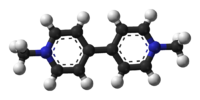
Photo from wikipedia
Introduction Paraquat poisoning can result in dysfunction of multiple organs, and pulmonary fibrosis with respiratory failure is the major cause of mortality. For terminally ill patients, some life-prolonging treatments can… Click to show full abstract
Introduction Paraquat poisoning can result in dysfunction of multiple organs, and pulmonary fibrosis with respiratory failure is the major cause of mortality. For terminally ill patients, some life-prolonging treatments can be non-beneficial treatments (NBT). The objective of this study was to determine if intubation is a NBT for patients with respiratory failure due to paraquat poisoning. Methods The study included 68 patients with respiratory failure due to paraquat poisoning. Patients were hospitalized at MacKay Memorial Hospital, Taitung Branch, Taiwan, between 2005 to April 2016. Composite outcomes of intra-hospital mortality, the rate of do-not-resuscitate (DNR) orders, prescribed medications, length of stay, and medical costs were recorded and compared between the do-not-intubate (DNI) group and endotracheal intubation (EI) group. Results Intra-hospital mortality rate for the entire population was 100%. There were significantly more patients with DNR orders in the DNI group (P = 0.007). There were no differences in the length of hospital stay. However, patients in DNI group had significantly less vasopressor use and more morphine use, shorter time in the intensive care unit, and fewer medical costs. Conclusion The procedure of intubation in patients with respiratory failure due to paraquat poisoning can be considered inappropriate life-prolonging treatment.
Journal Title: PLoS ONE
Year Published: 2018
Link to full text (if available)
Share on Social Media: Sign Up to like & get
recommendations!